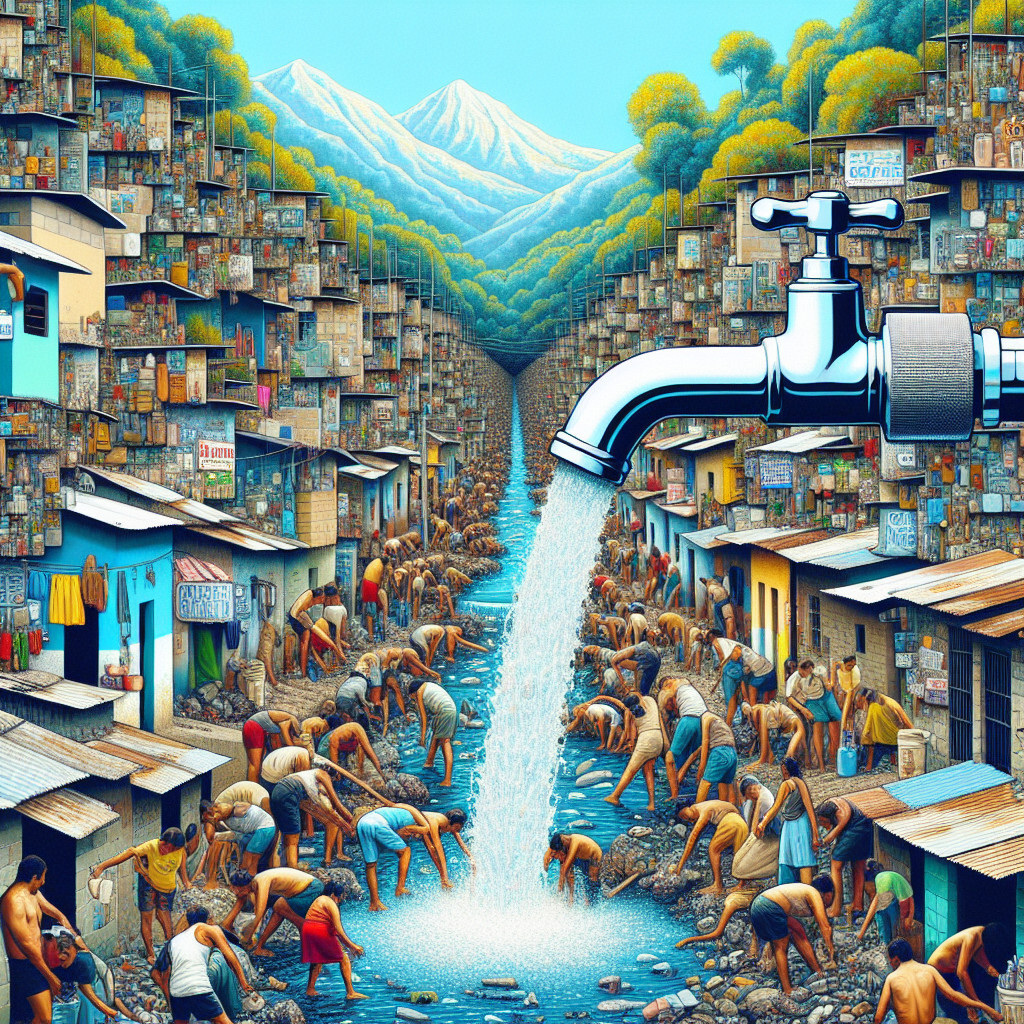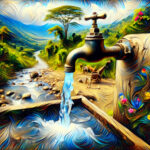-
Table of Contents
“El Salvador’s Tap Water: A Question of Quality and Safety”
Introduction

Tap water in El Salvador is generally not considered safe to drink. Despite efforts to improve the water quality, issues such as contamination and lack of proper sanitation facilities persist. The water supply is often polluted with industrial and agricultural runoff, leading to a high risk of waterborne diseases. Therefore, locals and visitors are advised to drink bottled or filtered water.
Understanding the Quality of Tap Water in El Salvador
El Salvador, the smallest and most densely populated country in Central America, is known for its breathtaking landscapes, rich culture, and warm-hearted people. However, one aspect that often raises concerns among both locals and visitors is the quality of tap water. Understanding the quality of tap water in El Salvador is crucial for health and safety reasons, and it also provides insights into the broader issues of water management and sanitation in the country.
El Salvador’s tap water quality varies significantly across the country. In urban areas, the tap water is generally treated and considered safe for consumption. The national water and sewerage company, Administración Nacional de Acueductos y Alcantarillados (ANDA), is responsible for providing water services in these areas. They ensure that the water is treated with chlorine to kill bacteria and other harmful microorganisms, making it safe for drinking, cooking, and other household uses.
However, the situation is quite different in rural areas. Many of these regions lack access to treated tap water, relying instead on wells, rivers, or rainwater for their water supply. This water is often contaminated with bacteria, parasites, and other pollutants, posing serious health risks. In fact, waterborne diseases such as diarrhea and cholera are common in these areas, particularly among children.
Moreover, even in areas where treated tap water is available, its quality can be inconsistent. Infrastructure problems, such as old and deteriorating pipes, can lead to contamination of the water supply. Additionally, natural disasters such as earthquakes and hurricanes, which are common in El Salvador, can damage water infrastructure and further compromise water quality.
The issue of tap water quality in El Salvador is further complicated by the country’s water scarcity problem. El Salvador is one of the most water-stressed countries in Central America, with demand for water often exceeding supply. This scarcity is due to a combination of factors, including population growth, urbanization, deforestation, and climate change. As a result, many people in El Salvador, particularly those in poor and rural communities, struggle to access clean and safe water.
The government of El Salvador, along with international organizations and non-governmental organizations, is working to improve the country’s water situation. Efforts are being made to upgrade water infrastructure, expand access to treated tap water, and promote water conservation. However, progress has been slow, and many challenges remain.
In light of these issues, it is generally recommended that visitors to El Salvador avoid drinking tap water, especially in rural areas. Instead, they should opt for bottled water or use water purification methods such as boiling or using water purification tablets. Locals are also increasingly turning to these alternatives, reflecting growing concerns about tap water quality.
In conclusion, the quality of tap water in El Salvador is a complex issue, influenced by a range of factors including geography, infrastructure, and socio-economic conditions. While efforts are being made to improve the situation, it is clear that much work remains to be done. In the meantime, both locals and visitors should take precautions to ensure their water is safe for consumption.
The Impact of Infrastructure on El Salvador’s Tap Water
El Salvador, the smallest and most densely populated country in Central America, has been grappling with numerous challenges related to its tap water supply. The quality and accessibility of tap water in El Salvador are significantly influenced by the country’s infrastructure, which has been shaped by a complex interplay of historical, political, and environmental factors.
The country’s water infrastructure is primarily characterized by a lack of adequate investment and maintenance. This has resulted in a system that is not only inefficient but also incapable of meeting the growing demand for clean water. The World Health Organization estimates that approximately 88% of Salvadorans have access to improved water sources, but this figure obscures the fact that many rural communities and impoverished urban areas are often left without reliable access to clean water.
The quality of tap water in El Salvador is also a major concern. The country’s water sources are heavily contaminated due to industrial pollution, agricultural runoff, and inadequate waste management. This has led to high levels of waterborne diseases, particularly among children. The lack of effective regulation and enforcement has further exacerbated the problem, allowing polluters to continue their harmful practices with impunity.
Climate change is another factor that has had a profound impact on El Salvador’s water infrastructure. The country is highly vulnerable to extreme weather events, such as hurricanes and droughts, which can disrupt water supply and damage infrastructure. Moreover, rising temperatures and changing rainfall patterns are expected to exacerbate water scarcity in the future, placing additional strain on the already fragile system.
Despite these challenges, there have been some positive developments in recent years. The government of El Salvador has recognized the importance of improving water infrastructure and has taken steps to address the issue. For instance, in 2019, the country passed a landmark law that recognizes access to water and sanitation as a human right. The law also establishes a national water authority responsible for managing water resources and ensuring their equitable distribution.
International organizations and non-governmental organizations have also played a crucial role in improving El Salvador’s water infrastructure. They have provided funding for infrastructure projects, technical assistance, and capacity-building programs. These initiatives have helped to improve access to clean water in some of the country’s most marginalized communities.
However, much more needs to be done to ensure that all Salvadorans have access to clean, safe tap water. This will require not only increased investment in infrastructure but also comprehensive reforms to improve governance, strengthen regulation, and promote sustainable water management practices. It will also require addressing the underlying social and economic inequalities that contribute to disparities in access to water.
In conclusion, the state of tap water in El Salvador is a reflection of the country’s broader infrastructure challenges. While progress has been made in recent years, significant obstacles remain. Overcoming these obstacles will require a concerted effort from all stakeholders, including the government, civil society, and the international community. By working together, it is possible to build a water infrastructure system that is resilient, equitable, and capable of meeting the needs of all Salvadorans.
Health Implications of Drinking Tap Water in El Salvador
El Salvador, the smallest and most densely populated country in Central America, is known for its breathtaking landscapes, rich culture, and warm-hearted people. However, beneath the surface of this vibrant nation lies a pressing issue that affects the health and well-being of its inhabitants – the quality of its tap water.
In El Salvador, the availability and quality of tap water vary significantly across the country. While some regions have access to relatively clean and safe water, others are not so fortunate. The water in these areas is often contaminated with harmful bacteria, viruses, and parasites, which can lead to a range of health problems, including diarrhea, cholera, and typhoid fever.
The primary source of contamination in El Salvador’s tap water is fecal matter, which enters the water supply through inadequate sanitation facilities and poor waste management practices. This is particularly prevalent in rural areas, where access to clean water and sanitation services is limited. In these regions, people often rely on rivers, wells, and other unprotected sources for their water needs, which are highly susceptible to contamination.
Furthermore, El Salvador’s water supply is also affected by industrial pollution. Many industries in the country, including agriculture, mining, and manufacturing, discharge untreated wastewater into rivers and streams, which eventually finds its way into the tap water supply. This not only contributes to the spread of waterborne diseases but also exposes people to harmful chemicals and heavy metals, which can have long-term health effects.
The health implications of drinking contaminated tap water in El Salvador are significant. According to the World Health Organization, diarrheal diseases alone, primarily caused by unsafe water and inadequate sanitation, account for approximately 10% of all deaths in children under five in the country. Moreover, exposure to harmful chemicals and heavy metals in the water can lead to chronic health conditions, such as kidney damage, neurological disorders, and various types of cancer.
Despite these challenges, efforts are being made to improve the quality of tap water in El Salvador. The government, in collaboration with international organizations, has implemented several initiatives aimed at expanding access to clean water and sanitation services, particularly in rural areas. These include the construction of new water supply systems, the promotion of safe hygiene practices, and the enforcement of stricter regulations on industrial pollution.
However, while these initiatives have led to some improvements, much work remains to be done. Ensuring access to clean and safe tap water for all Salvadorans is not only a matter of public health but also a fundamental human right. As such, it requires the concerted effort of all stakeholders, including the government, the private sector, civil society, and the international community.
In conclusion, the quality of tap water in El Salvador is a critical issue that has significant implications for the health of its population. While progress has been made in recent years, the country still faces considerable challenges in ensuring that all its citizens have access to clean and safe water. As such, it is essential for continued efforts to be made to address this issue, not only to protect the health of Salvadorans but also to uphold their fundamental human rights.
Solutions to Improve Tap Water Quality in El Salvador
El Salvador, the smallest and most densely populated country in Central America, is known for its breathtaking landscapes, rich culture, and warm-hearted people. However, beneath this vibrant exterior lies a pressing issue that has been plaguing the nation for years – the quality of its tap water.
The tap water in El Salvador is not considered safe to drink due to various factors. The country’s water sources are often contaminated with harmful bacteria, heavy metals, and other pollutants due to inadequate sanitation facilities, industrial waste, and agricultural runoff. This has led to a high incidence of waterborne diseases and has posed significant health risks to the population, particularly in rural areas where access to clean water is limited.
The government of El Salvador has recognized the gravity of the situation and has been making concerted efforts to improve the quality of tap water. One of the primary solutions being implemented is the construction of modern water treatment facilities. These facilities are designed to remove harmful contaminants from the water through a series of processes including filtration, disinfection, and sedimentation. This not only ensures that the water is safe to drink but also improves its taste and odor.
In addition to building water treatment facilities, the government is also investing in infrastructure to improve the distribution of clean water. This includes the construction of new pipelines and the repair of existing ones to prevent leaks and contamination. Moreover, efforts are being made to expand the water distribution network to reach more households, particularly in rural areas.
Education is another crucial aspect of the solution. The government, in collaboration with various non-governmental organizations, is conducting awareness campaigns to educate the public about the importance of clean water and the dangers of consuming contaminated water. These campaigns also provide information on how to purify water at home using simple methods such as boiling or using water purification tablets.
Furthermore, the government is implementing stricter regulations on industries and agriculture to prevent the pollution of water sources. This includes enforcing laws that prohibit the dumping of industrial waste into rivers and lakes and promoting sustainable farming practices to reduce agricultural runoff.
While these solutions are a step in the right direction, there is still a long way to go. The process of improving the quality of tap water in El Salvador is a complex one that requires significant investment, time, and effort. However, with the continued commitment of the government and the support of the international community, there is hope that the people of El Salvador will soon have access to clean and safe tap water.
In conclusion, the quality of tap water in El Salvador is a pressing issue that needs immediate attention. The government is taking proactive steps to address this problem through the construction of water treatment facilities, improvement of water distribution infrastructure, education, and stricter regulations. While these efforts are commendable, it is crucial to continue working towards this goal to ensure that every citizen of El Salvador has access to clean and safe drinking water.
Q&A
1. Question: Is the tap water in El Salvador safe to drink?
Answer: No, the tap water in El Salvador is generally not considered safe to drink due to potential contamination with bacteria, viruses, or parasites.
2. Question: What are the common contaminants in El Salvador’s tap water?
Answer: Common contaminants in El Salvador’s tap water can include bacteria, viruses, parasites, and sometimes heavy metals and pesticides.
3. Question: How do locals in El Salvador consume water?
Answer: Locals in El Salvador often consume bottled water or use water purification methods such as boiling or filtering for tap water.
4. Question: What is the government doing to improve the tap water quality in El Salvador?
Answer: The government of El Salvador has been working on improving water infrastructure and sanitation facilities, as well as implementing water quality monitoring systems. However, progress can be slow and access to clean water remains a significant issue in many areas.
Conclusion
The tap water in El Salvador is generally not safe to drink due to potential contamination with harmful bacteria and parasites. It is recommended to drink bottled or purified water instead.






